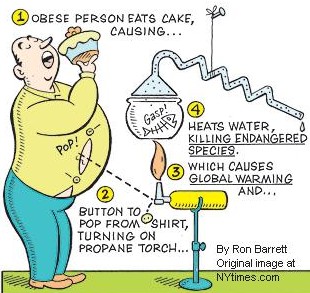Reduction
Sunday, November 05, 2006 → by Robokku The world is too complicated. There's no way we can take it all in at once. Our brains get confused. They have to be a little creative with the truth in order to make it manageable. We have to dumb things down. Some of us more than others.
The world is too complicated. There's no way we can take it all in at once. Our brains get confused. They have to be a little creative with the truth in order to make it manageable. We have to dumb things down. Some of us more than others.That's fine. We can't complain about it. It's a necessary part of life. But we shouldn't forget we're doing it.
On Friday The Guardian revealed the shocking news that people in the UK are fat and they don't like George W. It's the fat part I'm thinking about today. For a government, unhealthy citizens are bad news. They don't make as much money because they can't do as much stuff as healthy people, and they cost more money because they're ill and require treatment. However, ill-health is not so easy to pin down, coming as it does in many different guises. If you want to tackle a problem like this, you need a clearer target. And what makes a better target than a big fat person (chubber)? A lot of people in the UK these days are ill because they're too fat. So the government decided to reduce the number of unhealthy people by reducing the number of fat people. So far so good: tackle obesity, tackle ill health; the nation will be sleek and lean.
 A government of course needs to be accountable. So we need to monitor the progress of our anti-obesity measures. So we need to measure obesity rates and see what happens to them. However, like illness, excess fat can be a bit awkward to get a hold on. Some people are clearly much to wobbly, so no problem getting those ones on the list. But some people could go either way: they're kind of chubby, but they might be medically OK. They might work hard and run around and just enjoy stuffing their faces in between. It's the ill fat people who we want to count as "clinically obese", to add to our list and try to sort out. But we can't just count the ill ones because then we're back where we started. Picking out the chubby types gave us a nice shortcut to dealing with illness without having to search for it. It was a good rule of thumb and if we start looking for illness per se again then we've undermined it.
A government of course needs to be accountable. So we need to monitor the progress of our anti-obesity measures. So we need to measure obesity rates and see what happens to them. However, like illness, excess fat can be a bit awkward to get a hold on. Some people are clearly much to wobbly, so no problem getting those ones on the list. But some people could go either way: they're kind of chubby, but they might be medically OK. They might work hard and run around and just enjoy stuffing their faces in between. It's the ill fat people who we want to count as "clinically obese", to add to our list and try to sort out. But we can't just count the ill ones because then we're back where we started. Picking out the chubby types gave us a nice shortcut to dealing with illness without having to search for it. It was a good rule of thumb and if we start looking for illness per se again then we've undermined it.So let's make up another rule of thumb. Let's measure your weight and your height and divide the former by the latter. If you're tall and light you score low, if you're short and heavy you score high. Your score is your body mass index (BMI). Now, rather than looking for fat people, we can just look for people with a high BMI - say, greater than or equal to thirty. (In actuality, above twenty-five and you're 'overweight', thirty and up and you're 'obese'.)
Roughly speaking, then, unhealthy people are fat people and fat people are people with a BMI of 30+. Roughly speaking, you can determine how healthy someone is using a tape and scales. "Roughly speaking" - that's the important part. It's an approximation, a dumbing down. It is not true that if your BMI is 30 then you are unhealthy, but it is true that if you get all the people in a big group with a BMI of 30+ to lose a little weight, there will be plenty fewer unhealthy people in that group.
 As I said at the top of this post, simplifying things is fine, but we shouldn't forget we're doing it. For instance, if we were to forget that 'has BMI 30+' doesn't just mean 'is unfit' then we could do some really stupid things. We might start refusing hip operations to anyone who has BMI 30+. Or we might make a BMI of 28 a requirement of entry to the armed forces - so we only get the super fit ones. That would be pretty stupid.
As I said at the top of this post, simplifying things is fine, but we shouldn't forget we're doing it. For instance, if we were to forget that 'has BMI 30+' doesn't just mean 'is unfit' then we could do some really stupid things. We might start refusing hip operations to anyone who has BMI 30+. Or we might make a BMI of 28 a requirement of entry to the armed forces - so we only get the super fit ones. That would be pretty stupid.Following that kind of thinking, the people we'd be telling to go out and get some exercise would include many professional sportspeople, including nearly all professional rugby players, Brad Pitt, Russel Crowe, all body builders, George Clooney, Matt Damon, and Shaquille O'Neal.
The moral: any simplified representation should be stored with a mental note reading "this is a simplification".
|
|

 Links
Links Subscribe via RSS!
Subscribe via RSS!


 Via Email
Via Email


Post a Comment